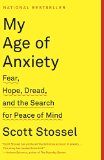Summary | Excerpt | Reviews | Beyond the Book | Readalikes | Genres & Themes | Author Bio

Critics' Opinion:
Readers' Opinion:
First Published:
Jan 2014, 416 pages
Paperback:
Feb 2015, 416 pages
 Book Reviewed by:
Book Reviewed by:
Elena Spagnolie
Buy This Book
In this book, I have set out to explore the "riddle" of anxiety. I am not a doctor, a psychologist, a sociologist, or a historian of science — any one of whom would bring more scholarly authority to a treatise on anxiety than I do. This is a work of synthesis and reportage, yoking together explorations of the idea of anxiety from history, literature, philosophy, religion, popular culture, and the latest scientific research — all of that woven through something about which I can, alas, claim extensive expertise: my own experience with anxiety. Examining the depths of my own neuroses may seem the height of narcissism (and studies do show that self-preoccupation tends to be tied to anxiety), but it's an exercise with worthy antecedents. In 1621, the Oxford scholar Robert Burton published his canonical The Anatomy of Melancholy, a staggering thirteen-hundred-page work of synthesis, whose torrents of scholarly exegesis only partially obscure what it really is: a massive litany of anxious, depressive complaint. In 1733, George Cheyne, a prominent London physician and one of the most influential psychological thinkers of the eighteenth century, published The English Malady, which includes the forty-page chapter "The Case of the Author" (dedicated to "my fellow sufferers"), in which he reports in minute detail on his neuroses (including "Fright, Anxiety, Dread, and Terror" and "a melancholy Fright and Panick, where my Reason was of no Use to me") and physical symptoms (including "a sudden violent Head-ach," "extream Sickness in my Stomach," and "a constant Colick, and an ill Taste and Savour in my Mouth") over the years. More recently, the intellectual odysseys of Charles Darwin, Sigmund Freud, and William James were powerfully driven by their curiosity about, and the desire to find relief from, their own anxious suffering. Freud used his acute train phobia and his hypochondria, among other things, to construct his theory of psychoanalysis; Darwin was effectively housebound by stress-related illnesses after the voyage of the Beagle — he spent years in pursuit of relief from his anxiety, visiting spas and, on the advice of one doctor, encasing himself in ice. James tried to keep his phobias hidden from the public but was often quietly terrified. "I awoke morning after morning with a horrible dread in the pit of my stomach and with a sense of insecurity of life that I never knew before," he wrote in 1902 of the onset of his anxiety. "For months, I was unable to go out in the dark alone."
Unlike Darwin, Freud, and James, I'm not out to adumbrate a whole new theory of mind or of human nature. Rather, this book is motivated by a quest to understand, and to find relief from or redemption in, anxious suffering. This quest has taken me both backward, into history, and forward, to the frontiers of modern scientific research. I have spent much of the past eight years reading through hundreds of thousands of the pages that have been written about anxiety over the last three thousand years.
My life has, thankfully, lacked great tragedy or melodrama. I haven't served any jail time. I haven't been to rehab. I haven't assaulted anyone or carried out a suicide attempt. I haven't woken up naked in the middle of a field, sojourned in a crack house, or been fired from a job for erratic behavior. As psychopathologies go, mine has been — so far, most of the time, to outward appearances — quiet. Robert Downey Jr. will not be starring in the movie of my life. I am, as they say in the clinical literature, "high functioning" for someone with an anxiety disorder or a mental illness; I'm usually quite good at hiding it. More than a few people, some of whom think they know me quite well, have remarked that they are struck that I, who can seem so even-keeled and imperturbable, would choose to write a book about anxiety. I smile gently while churning inside and thinking about what I've learned is a signature characteristic of the phobic personality: "the need and ability" — as described in the self-help book Your Phobia — "to present a relatively placid, untroubled appearance to others, while suffering extreme distress on the inside." *
Excerpted from My Age of Anxiety by Scott Stossel. Copyright © 2013 by Scott Stossel. Excerpted by permission of Knopf, a division of Random House LLC. All rights reserved. No part of this excerpt may be reproduced or reprinted without permission in writing from the publisher.





The Funeral Cryer by Wenyan Lu
Debut novelist Wenyan Lu brings us this witty yet profound story about one woman's midlife reawakening in contemporary rural China.
Your guide toexceptional books
BookBrowse seeks out and recommends the best in contemporary fiction and nonfiction—books that not only engage and entertain but also deepen our understanding of ourselves and the world around us.